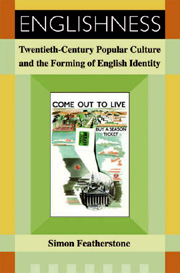3 - Festivals
Published online by Cambridge University Press: 12 September 2012
Summary
Every so often, the British state, impelled by coincidence of calendar or an anniversary that cannot easily be ignored, organises a public performance of national identity. The Festival of Britain in 1951 and the Millennium Experience of 2000 were the two main attempts in the second half of the twentieth century to re-articulate Englishness or Britishness. Unlike the Edwardian revivalist movements described in the previous chapter, these projections of identity were static, monumental and official, allowing for little of the personal idiosyncrasy and improvisation that characterised the movements of Baden-Powell, Sharp and Neal. Nevertheless, the need to present the nation in a tangible form that its citizens could visit and understand pressed the question of the available resources for describing and envisioning its future. As with the Scouts and the folk-dancers, the decisions taken about the location, content and style of the performances suggest continuities in the struggles to define Englishness as well as changes determined by the different historical and cultural circumstances of the events.
Framed by these two national celebrations, the 1984-5 Miners' Strike provides a disorderly, unofficial commentary on the festivals' national politics, cultural geographies and performances. The strike was the last great industrial conflict of twentieth-century Britain, but it also dramatised arguments about national identity and cohesion, most particularly, perhaps, about the legacies and fate of a postwar social and political settlement that the Festival of Britain had worked hard to establish and the Millennium Experience tried tentatively to revive.
- Type
- Chapter
- Information
- EnglishnessTwentieth-Century Popular Culture and the Forming of English Identity, pp. 47 - 65Publisher: Edinburgh University PressPrint publication year: 2008

